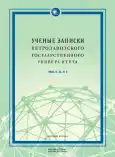PERSON, MOOD AND SENTENCE AS MUTUALLY CORRELATED LANGUAGE CATEGORIES
- 作者: Tarlanov Z.K.1
-
隶属关系:
- 期: 卷 45, 编号 4 (2023)
- 页面: 48-53
- 栏目: THEORETICAL, APPLIED AND CONTRASTIVE LINGUISTICS
- URL: https://journal-vniispk.ru/2542-1077/article/view/295382
- DOI: https://doi.org/10.15393/uchz.art.2023.908
- EDN: https://elibrary.ru/EYYBNP
- ID: 295382
如何引用文章
全文:
详细
The article covers the problem of intercategorical relations in languages of different systems based on thematerial of three fundamental grammatical categories - the categories of person, mood and syntactic type of sentence.It is established that these categories are genetically and functionally closely related to each other and this connection isone–way directed according to the person - mood – type of sentence scheme. The role of the category of person in theformation and use of moods is argumentatively shown, and the categories of person and mood – in the formation and useof the typology of sentences in different languages in accordance with their historically established systemic differences.The text-forming possibilities of personal forms 1 and 3 of persons are revealed, which constitute a narrative discourse incontrast to the form 2 of a person denoting the addressee of speech and the executor of someone else’s will. Based on acomparative functional analysis of the forms of the three analyzed categories, significant differences between inflectionalIndo-European languages (according to Russian) and agglutinative North Caucasian languages (according to Dagestani)in subsystems of personal forms of the 3rd person and unreal moods are demonstrated, including by the example of avolitive unknown to Indo-European languages. The results obtained can be used in Indo-European studies, Russian stud-ies, Caucasian studies and contrastive typology of languages. In the context of the directions of the development of his-torical syntax, the little-studied problem of the degree of lexical and lexico-grammatical determinacy of sentence types in the languages of the analytical and synthetic system is posed. A motivated thesis is formulated about the relationship between the types of moods and the types of sentences correlated with them with ethnopsychology and ethnomentality.
关键词
参考
补充文件








